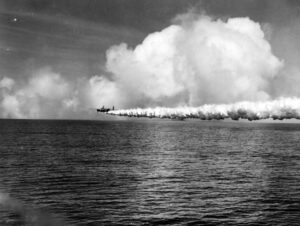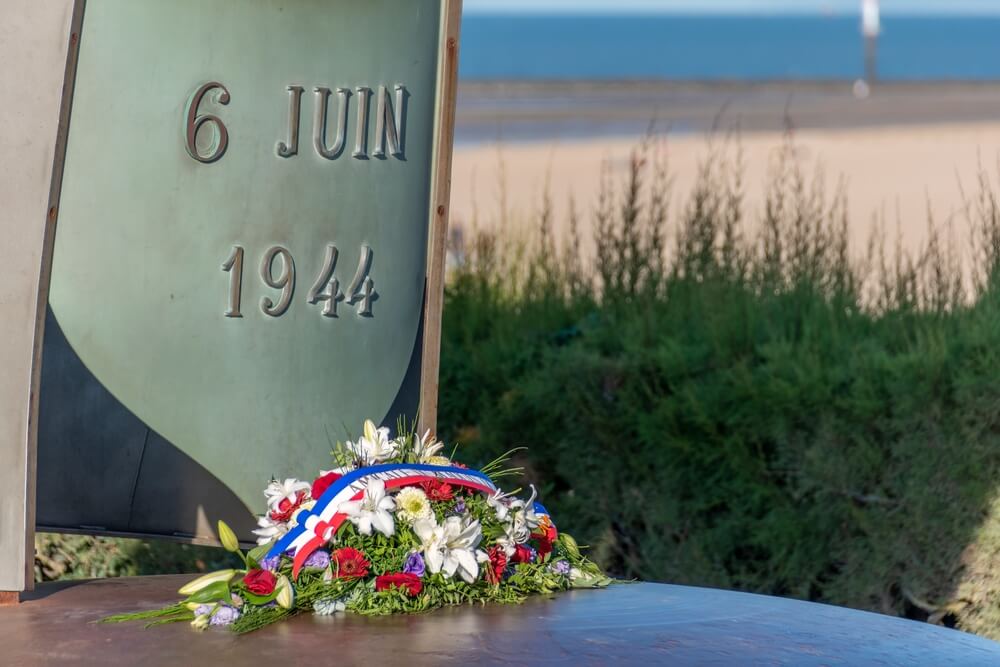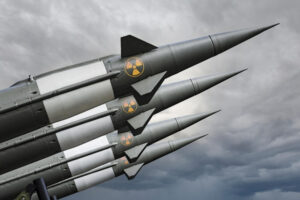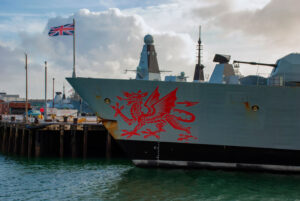Editor’s note: In commemoration of the 80th anniversary of the D-Day allied invasion on June 6, we present an excerpt from “Chamber Divers: The Untold Story of the D-Day Scientists who Changed Special Operations Forever,” by Rachel Lance, a biomedical engineer and blast-injury specialist who works as a scientific researcher on military diving projects at Duke University.
The book details the previously classified advances in underwater reconnaissance used in the run up to D-Day. The discoveries led to the safe use of miniature submarines and breathing apparatuses, which let the Allies take the beaches of Normandy.
This excerpt from chapter 17 follows the D-Day landing by British forces and the efforts of Edward Gueritz, who served as beachmaster on Sword Beach, organizing the flow of troops and military equipment on the beach, including 30,000 troops on the first day.
***
Someone vomited on Edward Gueritz, and he went up on deck to try to scrape it off.
The ship crews had been ordered not to use lights until dawn and to keep radio silence until the surprise had ended; they were isolated from one another on the journey. So, when Gueritz emerged on deck from inside the enclosed command ship LCH 185 in the early-morning hours of June 6, 1944, he looked out with fresh awe at the extent of the silent blackened armada of which he was now one tiny part. In every direction, he saw nothing but dark ships and craft stretching across hostile waters.
He was headed for Sword Beach. Normandy. When the Royal Air Force arrived, Gueritz, still on deck, watched with awe as “the whole horizon seemed to lift up in the air,” a massive cloud of smoke and fury from the first munitions onshore kicking the entire visual definition of land higher up into the sky.
As they approached the German-held beaches, return fire flashed bright from the muzzle of a German soldier hidden inside the windows of a large house onshore. The Allied support gunships “set [the house] well alight.”
The tanks headed for land first, with brutal, choppy waves battering against their canvas waterproof coatings. Two sank en route. By 0730 the beach was fully obscured by smoke, and more German gun emplacements kept opening fire in the chaos, their bright muzzle flashes popping deadly betrayal of their existence between the leaves of beachside greenery. Group I beached and unloaded quickly. The crews of their carrying vessels turned around to grab more troops.
To Gueritz, riding behind Groups I and II, the view struck him as gray. Gray clouds above. Gray smoke from firearms ahead. Gray mushrooms of smoke expanding upward from detonated rockets and bombs.
The pilot of Gueritz’s landing craft dodged the deadly maze of explosives-laden obstacles while the troops on board got battered about by the “nasty waves.” Gueritz and his commander had been assigned bodyguards to watch their backs while they focused on organizing the landing traffic, and Gueritz’s bodyguard, Kenneth George Oakley, stared at the hedgehogs and bombs with horror while they zigzagged through the heavy mortar fire raining down.
Group II was hot on the tails of Group I and finished unloading within minutes. More troops, tanks, and ships poured in, and the beach became a swarm. One of those ships was LCT 947.
The LCT that had been assigned number 947 was packed with Royal Engineers who were charged with blowing up mines and obstacles. Crews sat inside their tanks for the ride to shore, ready to drive onto the sand. Before the departure from England, tank-riding Lieutenant Colonel Arthur Cocks had cheerfully encouraged the loading crews of LCT 947 to work past a mechanical problem with getting the tanks on board. He had reassured them “bad start, good finish,” referring to his optimism about their arrival in Normandy.

Only one crew made it off. The next tank was hit by a mortar. It was hit in the turret, the turret from which Colonel Cocks was leaning . . . leaning and waving the other crews on, as before, always leading, always encouraging. The explosion took off his head.
His tank was carrying Bangalore torpedoes, which detonated, and a scream rang out from within. The explosion killed three, and LCT 947 went up in flames. Two other tanks were put out of commission by the blast, jeopardizing the ability to make usable beach exits.
Edward Gueritz splashed off the ramp of his craft near the flaming LCT 947, as did his commander. Tall Gueritz grabbed his shorter bodyguard, Oakley, and hauled him through the water. The tide was beginning to come in, and minute by minute, the mine-covered obstacles were becoming submerged. Gueritz and Oakley ran past the fiery tanks and deceased Cocks, past the beached and beaching crafts, and between the thickening splatter of their friends’ bodies lying on the dark wet sand.
Partway up the shoreline, Oakley yelled, “We down here!” They fell to the ground. They scraped away a small trench, a modest temporary shelter to give them a moment to regroup. The mortar fire was heavy but seemed to be mostly above them. If they stayed down, the Wehrmacht might not be able to lower their guns enough for a hit.
A tank crawled up to their position in the sand, and a soldier popped open the turret from inside. “Where’s the fire?” the soldier bellowed. Oakley pointed and shouted the compass orientation he had taken to a gun battery. The turret hatch clanged shut. The tank fired a projectile in the direction given, and the gun battery went silent.
Oakley and Gueritz hustled farther up the shore past the high-water line.
Early troops were supposed to place flags on the edges of the landing zone to help channel incoming traffic, and Oakley’s friend Sid Coxton had been tasked with placing one. Oakley found Sid lying flat on the beach with a deep, open gash oozing scarlet across his back. Sid’s kidneys were hanging out. Oakley pressed the kidneys inside, applied a makeshift bandage, grabbed Sid’s flag, and placed it in location.
“The horror of it was you couldn’t stop to help your buddy.” If someone stopped, they would be the next one to get it. Their only goal was to “get off the bloody beach.”

As new troops ran past the same bodies, they all knew that “the important thing [was] to keep the assault going.” The rich smell of earth, freshly turned by the blasts, mixed with the metallic aromas of torn flesh and blood, which mixed again with the acrid stench of detonated cordite. The morbid perfume filled the air and the nostrils of the young troops.
Despite the horrors found on those sands, the Brits landed 29,000 troops on Sword Beach during the landings of D-Day and suffered only 630 casualties in the process. In contrast, at Omaha the Americans saw over triple that rate per soldier with 2,400 casualties in their landing force of 34,000.
The difference, it could be argued, may have been navigation and proper marking. Prior to landing on Sword, the British sent over miniature submarines to mark the edges of their beaches. These “midget subs,” the X-20 and X-23 anchored at the edges of Sword and Gold and used light beacons and flags to usher in their troops to the correct locations.
The first swarms of landing vessels carried specialized navigators, like Edward Gueritz, whose only goal was to bring the others in on target. The subs were made possible only by extensive, years-long scientific testing of the breathing physiology in enclosed spaces beforehand. British scientists put themselves in narrow metal tubes to simulate the needed submarines in advance of the attack, and figured out ways to stay alive to guide the troops in so the troops could.
At Omaha there were no such markers. Troops infamously landed beneath gun batteries, and in areas of the sand with deep runnels where many drowned. This June marks the 80th anniversary of this lesson, and of the lives lost on the sands of France.







